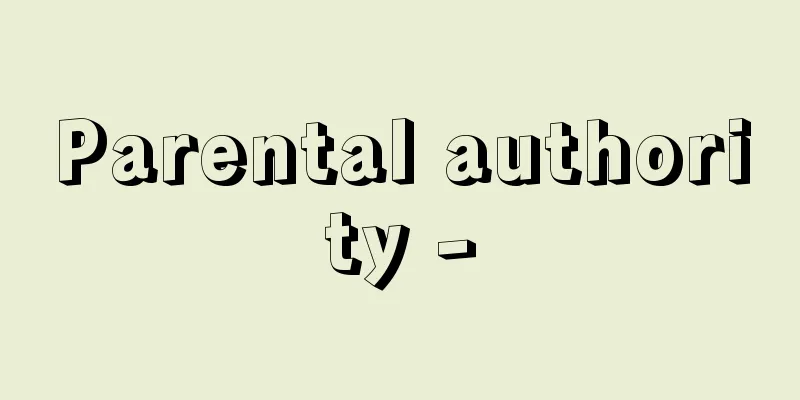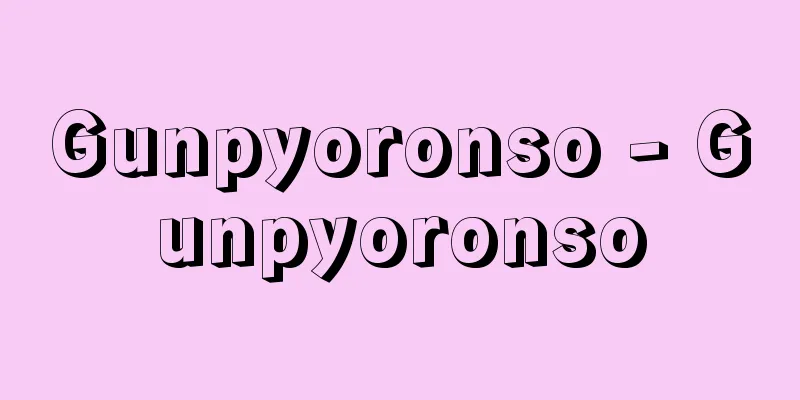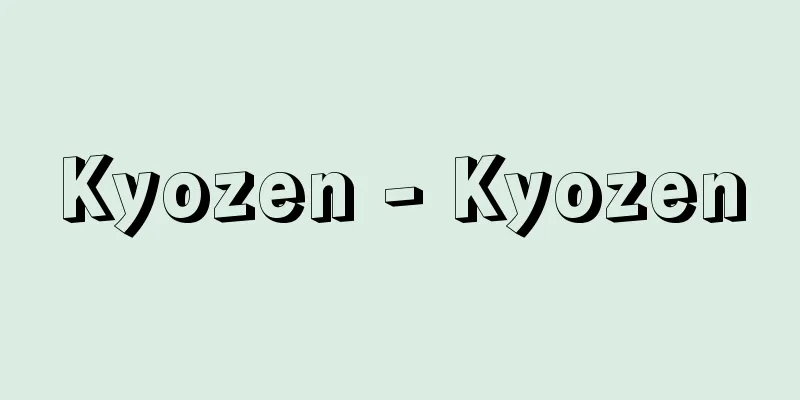Parental authority -

|
A general term for the various rights and obligations that parents have toward their minor children (both biological and adopted, but unmarried) (Article 818 and following of the Civil Code). Historically, there have been two major trends regarding the nature of parents' rights toward their children. One is the Roman law approach, which states that the father or head of the household has absolute control over his or her children. In this approach, only the father can have parental authority, and children remain subject to parental authority even after reaching adulthood. The other is the Germanic law approach. In Germanic law, parents have various rights toward their children, but this is considered to come from the purpose of protecting the weak. In this approach, mothers can also have parental authority, and only minor children are subject to parental authority. Roughly speaking, parental authority law has gradually changed from the former approach, which is based on authority, to the latter approach, which is based on protection. Currently, it is considered more correct to interpret parental authority as a duty given to parents to raise minor children, rather than as a parent's right. [Yasuyuki Takahashi and Masamitsu Nozawa, May 19, 2016] Parental authorityIn principle, the parents of a minor child exercise parental authority. If both parents of a minor child are alive, the parents generally exercise parental authority jointly, but if one of them is not present, is absent for a long period of time and is unable to exercise parental authority, or is declared to have lost parental authority, only the other parent will have parental authority (Civil Code, Article 818, Paragraph 3). If the parents divorce, in the case of a divorce by agreement, the court will determine which of the parents will have parental authority, and in the case of a divorce by court order, the court will determine which of the parents will have parental authority. The mother exercises parental authority over a child born out of wedlock, but if the father acknowledges paternity, the father can also be the parent with parental authority (Civil Code, Article 819). In the case of an adopted child, the adoptive parents, not the biological parents, will have parental authority. If the person who should have parental authority is no longer available or if the parent with parental authority does not have the right to manage the child, guardianship of the minor will commence (Civil Code, Article 838, Paragraph 1). [Yasuyuki Takahashi and Masamitsu Nozawa, May 19, 2016] Contents of parental authorityIn order to ensure the healthy protection and upbringing of minor children, the Civil Code lists the rights and obligations of parents. (1) The person with parental authority has the right and the obligation to care for and educate the child for the child's benefit (Article 820 of the Civil Code). When parents divorce, the decision of who will have custody of the minor child is decided by mutual agreement, or by the family court if they cannot reach an agreement. The person with custody may be the same as the person with parental authority or may be different. (2) Parents have the right to designate the child's place of residence in order to achieve the purpose of custody and education (Article 821 of the same law). In cases where a third party has taken a minor child away and has not returned him or her to the parents, the parents can use this right to request the court to remove the third party's interference. (3) The parent may discipline his or her own child to the extent necessary for the purposes of custody and education (Article 822 of the same Act). (4) A minor child may not engage in any occupation without the permission of his/her parent. Even if permission is granted, if the minor is deemed not yet capable of engaging in business, the permission may be revoked or restricted (Article 823 of the same law). (5) A person with parental authority shall manage the child's property with the same degree of care as he/she manages his/her own property (Article 827 of the same law). However, if a third party gives a child property free of charge and the parents are not allowed to manage it, the property does not fall under the parents' control (Article 830, Paragraph 1 of the same law). Furthermore, with regard to the child's property transactions, the person with parental authority shall perform legal acts on behalf of the child as the child's legal representative (Article 824 of the same law). When a minor child becomes capable of making decisions for himself/herself, the person with parental authority may merely give consent to the child's property transactions. However, if the child only benefits but bears no obligations, the child does not need to obtain the consent of the person with parental authority (Article 5, Paragraph 1 of the same law). [Yasuyuki Takahashi and Masamitsu Nozawa, May 19, 2016] Parental Rights RestrictionsEven if a parent acts as the legal representative of a child, he or she cannot enter into a labor contract on behalf of the minor (Article 58, Paragraph 1, of the Labor Standards Act). Parents and employers cannot arbitrarily decide on a child's employment. In addition, when a parent purchases real estate owned by a child or divides an inheritance among several children, the child's interests may be harmed if the parent acts on behalf of the child, so in such cases, the parent must request the family court to appoint a special representative (Article 826, of the Civil Code). [Yasuyuki Takahashi and Masamitsu Nozawa, May 19, 2016] Loss or suspension of parental rights or loss of controlSince parental authority is a parent's duty for the child, the parent cannot quit arbitrarily, and in the case of unavoidable circumstances such as illness, the parent may quit parental authority or management of property with the permission of the family court (Article 837, Paragraph 1, Civil Code). In addition, since the parent exercises parental authority for the benefit of the child (Article 820, Civil Code), the family court may deprive parents of their parental authority status (judgment for loss of parental authority = Article 834, Civil Code), suspend their parental authority status for up to two years (judgment for suspension of parental authority = Article 834-2, Civil Code), or deprive them of the right to manage property only (judgment for loss of management rights = Article 835, Civil Code). The children, their relatives, the guardian of minors, the guardianship supervisor of minors, or the public prosecutor may file for these judgments. Due to the increase in child abuse, the number of applications for loss or suspension of parental authority is increasing. [Yasuyuki Takahashi and Masamitsu Nozawa, May 19, 2016] Parental Rights in International Parent-Child RelationshipsThere are three types of international parent-child relationships: legitimate parent-child relationships for children born to a married couple, illegitimate parent-child relationships for children born to couples who are not married, and adoptive parent-child relationships for children who have been adopted through adoption. According to Article 32 of the Act on General Rules for Application of Laws (Act No. 78 of 2006), which is a private international law code in Japan, the governing law for legal relations between parents and children, including parental authority, is determined by the following stages of connection: In the first stage, if the national law of either the surviving father or mother is the same as the national law of the child, that law shall apply. In this case, for persons with multiple nationalities, the law of the country in which they have a habitual residence, if there is one, shall be applied; if there is no such country, the law of the country with which the parties are most closely related shall be determined based on the specific circumstances, and the law of that country shall be the national law of the person (Article 32, Paragraph 1 of the same Act). On the other hand, in the case of stateless persons, this first stage is not considered to exist (Proviso, Article 32, Paragraph 2 of the same Act). If this first step is not met, the second step is to determine the governing law as the law of the child's habitual residence. The first stage of determining the governing law was enacted due to the practical need to allow the process of designating custodial authority in a divorce by agreement to be handled through a formality review at the family registry office. In other words, when a divorce by agreement is made under Japanese law, if there is a child, one of the parents must be designated as the custodial authority. In most cases of divorce by agreement filed in Japan, one of the parents is Japanese, so if the child is also Japanese and the family registry confirms this, the first stage can determine that Japanese law will be the governing law through a formality review alone. Incidentally, the Japanese Nationality Act adopts the principle of jus sanguinis, so if one of the parents is Japanese, the child is, in principle, Japanese. In general, it is rare for the child's national law to differ from the national law of either parent, and the governing law is almost always determined in the first stage. Furthermore, because parental authority is exercised in the relationship between a minor child and a parent, a preliminary issue in applying Article 32 of the General Rules for Application of Laws is whether or not the child is a minor. However, Article 4 of the same Act stipulates that a person's capacity to act shall be governed by the law of his or her nationality, and this depends on what the applicable law defines as the age of majority. [Masato Michigauchi May 19, 2016] International child abductionThe most serious case of parental rights being violated is when parents fight over a child after the breakdown of their marriage, leading to the child being taken across borders. There have been cases in which children taken from Japan have been sought in foreign courts, and cases in which children taken from abroad to Japan have been sought in Japanese courts. The procedure used in Japan is the Habeas Corpus Act (Act No. 199 of 1948). It originally had its origins in the writ of habeas corpus, which was developed in the UK to request the court to release a person from unjust arrest by those in power, and was introduced to Japan after World War II. However, since it provides a quick and effective solution, it has been used in Japan to return children, including in domestic cases. An order to hand over a child is issued when it is found that the child is being illegally detained, and in this type of case, the illegality is judged from the perspective of where the child would be better off living in for his or her own happiness. In cases of international child abduction, the most important thing is to quickly restore the status quo. Otherwise, the child will quickly become accustomed to the new country and it will be difficult to return the child to his or her original country. For this reason, treaties have been concluded to create an international cooperative system. The Convention on the Civil Aspects of International Child Abduction was adopted at the Hague Conference on International Private Law in 1980. Upon application, a central authority designated in advance in each country (the Ministry of Foreign Affairs in Japan) will take the necessary measures for the return of the child, such as discovering the child's whereabouts, providing assistance in the trial, and exchanging information. As of January 2016, there are 93 contracting states, mainly developed countries. Japan ratified the Convention in 2014, and has enacted and is implementing the Act on the Implementation of the Convention on the Civil Aspects of International Child Abduction (Act No. 48 of 2013). [Masato Michigauchi May 19, 2016] [References] | |Head of | |Private | | | | | | | | | | |Source: Shogakukan Encyclopedia Nipponica About Encyclopedia Nipponica Information | Legend |
|
父母が未成年の子(実子および養子、ただし未婚の者)に対して有するさまざまな権利・義務の総称(民法818条以下)。親の子に対する権利をどのような性質のものとするかについては、歴史的にみて二つの大きな潮流があった。一つはローマ法の考え方で、父親あるいは家長は子のうえに絶対的な支配権を有するというものである。そこでは、父親だけが親権者となることができ、また、子は成年に達しても親権に服した。他の一つはゲルマン法の考え方である。ゲルマン法では、親は子に対してさまざまな権利をもつが、それは弱者に対する保護という目的からくるのだと考える。そこでは母親も親権者となりうるし、親権に服するのは未成年の子だけということになる。大ざっぱにいえば、親権法は、権威を主柱とする前者の考え方から、保護を目的とする後者の考え方にしだいに変遷してきたといえる。現在では、親権は親の権利というよりは、むしろ未成年の子を養育するために、親に対して与えられた職分であると解するほうが正しいとされる。 [高橋康之・野澤正充 2016年5月19日] 親権者親権を行うのは原則として未成年の子の父母である。未成年の子の父母が健在ならば父母が共同で親権を行うのが原則であるが、その一方がいなかったり、長期間不在のため事実上親権を行うことができなかったり、親権喪失の宣告を受けたりしたときは、他の一方だけが親権者となる(民法818条3項)。また父母が離婚をする場合には、協議離婚のときは協議で、裁判離婚のときは裁判所が、それぞれ父母のどちらか一方を親権者と定める。嫡出でない子に対しては母が親権を行うが、父が認知した場合には父を親権者とすることもできる(同法819条)。養子に対しては実親ではなく養い親が親権者となる。なお親権者となるべき者がいなくなり、または親権者が管理権を有しないときは、未成年後見が開始することになる(同法838条1号)。 [高橋康之・野澤正充 2016年5月19日] 親権の内容未成年の子の健全な保護育成のために民法は親権者の権利・義務を列挙している。 (1)親権者は、子の利益のために子の監護・教育をする権利を有し、義務を負う(民法820条)。父母が離婚する場合には、どちらが未成年の子を監護するかを、協議で、協議が調わないときは家庭裁判所が定める。監護者は親権者と同じであっても異なってもよい。 (2)親権者は監護・教育の目的を達するために、子に対してその居所を指定する権利がある(同法821条)。他人が未成年の子を連れ去って親のもとに帰さないときなどは、親はこの権利に基づいて、その他人の妨害の排除を裁判所に請求できることになる。 (3)監護・教育のために必要な範囲内で自分の子を懲戒することができる(同法822条)。 (4)未成年の子は親権者の許可を得なければ職業を営めない。いったん許可を与えても、未成年者がまだ営業に耐えないとみられるときは、許可を取り消したり、制限したりすることができる(同法823条)。 (5)親権者は自分の財産を管理するのと同じ程度の注意を払って、子の財産を管理する(同法827条)。しかし第三者が無償で子に与えた財産について、父母に管理させないといったときは、その財産は父母の管理に属さない(同法830条1項)。また子の財産上の行為については、親権者は法定代理人として子にかわって法律行為をする(同法824条)。未成年の子が自分で判断する能力をもつようになると、子が行う財産上の行為に親権者が同意を与えるだけでもよい。ただし子が利益を得るだけでなにも義務を負わない場合には、子は親権者の同意を得なくてもよい(同法5条1項)。 [高橋康之・野澤正充 2016年5月19日] 親権の制限親権者が子の法定代理人として行為する場合でも、未成年者にかわって労働契約を締結することはできない(労働基準法58条1項)。親と雇主との間でかってに子の就職を決めてはならないのである。また、親が子の有する不動産を買ったり、数人の子のために遺産分割をするような場合に、親権者がその子を代理しては子の利益を害することがありうるから、そのような場合には、特別代理人を定めることを家庭裁判所に請求しなければならない(民法826条)。 [高橋康之・野澤正充 2016年5月19日] 親権の喪失・停止・管理権の喪失親権は子のために負う親の義務であるから、親権者はかってにやめることはできず、病気などのやむをえない事由があるときは、家庭裁判所の許可を得て、親権者または財産の管理をやめることができる(民法837条1項)。また、親権者は、子の利益のために親権を行使するのであるから(同法820条)、親権を適切に行使しない父母については、家庭裁判所が、親権者の地位を剥奪(はくだつ)する(親権喪失の審判=同法834条)か、2年を上限に親権者の地位を停止する(親権停止の審判=同法834条の2)か、財産管理権のみを剥奪する(管理権喪失の審判=同法835条)ことができる。これらの審判を申し立てることができるのは、子、その親族、未成年後見人、未成年後見監督人または検察官である。児童虐待の増加により、親権の喪失・停止の申立てが増えている。 [高橋康之・野澤正充 2016年5月19日] 国際的親子関係における親権国際的親子関係には、夫婦から生まれた子についての嫡出親子関係、夫婦でない男女間から生まれた子についての非嫡出親子関係、さらに、養子縁組により養子となった子についての養親子関係があるが、日本の国際私法典である「法の適用に関する通則法」(平成18年法律第78号)第32条によれば、いずれのタイプの親子関係であれ、親権を含む親子間の法律関係については次のような段階的連結により準拠法が定められることとされている。すなわち、第1段階として、生存している父または母の本国法のいずれかが子の本国法と同一であれば、その法による。この場合、重国籍者については、国籍を有する国のうち常居所を有する国があればその国の法、そのような国がなければ当事者にもっとも密接に関係する国を具体的状況に基づいて判断し、その国の法がその者の本国法とされる(同法32条1項)。他方、無国籍者の場合にはこの第1段階は成立しないものとして扱われる(同法32条2項但書)。次に、この第1段階が成立しない場合には、第2段階として、子の常居所地法が準拠法とされる。 このように、第1段階の準拠法決定が立法されたのは、協議離婚の際の親権者の指定の場合、戸籍窓口での形式審査だけで処理ができるようにするという実務上の必要によるものである。すなわち、日本法により協議離婚をする場合、子がいるときには、父母のいずれか一方を親権者と定める必要があるところ、日本での協議離婚届がされる多くは、いずれか一方の親が日本人である場合が多いので、子も日本人であることが戸籍で確認できれば、前記の第1段階により日本法が準拠法となることを形式審査だけで確定することができるからである。ちなみに、日本の国籍法では父母両性血統主義が採用されているので、いずれか一方の親が日本人であれば、原則として子も日本人である。一般に、子の本国法が両親の本国法のいずれとも異なることはまれであり、前記の第1段階で準拠法が定まる場合がほとんどである。 なお、親権は未成年者の子と親との関係において行使されるものであるから、法の適用に関する通則法第32条の適用の先決問題として子が未成年者か否かを決定する必要があるが、これについては人の行為能力はその本国法によると定める同法第4条により、その準拠法が成年年齢を何歳としているかによることになる。 [道垣内正人 2016年5月19日] 国際的な子の奪い去り親権が害される場合としてもっとも深刻なのは、婚姻関係が破綻(はたん)した両親の間で子の奪い合いが生じ、国境を越えて子を連れ去る事件である。日本から連れ去られた子の取戻しを外国の裁判所で請求することや、国外から日本へ連れ去った子についての日本の裁判所での取戻し請求事件が現実に発生している。日本での手続として利用されてきたのは、人身保護法(昭和23年法律第199号)である。本来は権力者による不当逮捕等からの解放を裁判所に求めるためにイギリスで発達した「人身保護令状」に起源を有するものであり、第二次世界大戦後に日本に導入された制度であるが、迅速かつ実効的な解決が与えられるので、日本では国内事件を含めて子の連れ戻しのために活用されてきた。子の引渡し命令がなされるのは、違法に拘束されていると認定される場合であり、この種の事件では、違法性は子の幸福のためにはどちらで生活するのがよいかという観点から判断される。 国際的な子の奪い去りの場合に重要なことは迅速な原状回復である。そうでなければ、子はすぐに新しい国に慣れてしまい、元の国に戻すことが困難となるからである。そこで、国際的な協力体制をつくろうとする条約が締結されている。1980年(昭和55)にハーグ国際私法会議で採択された「国際的な子の奪取の民事上の側面に関する条約」がこれであり、申立てにより、各国であらかじめ定められた中央当局(日本では外務省)が子の所在の発見、裁判の援助、情報交換等、子の返還のために必要な措置をとることとされている。先進国を中心に93の締約国を数えている(2016年1月時点)。日本は2014年(平成26)に批准し、「国際的な子の奪取の民事上の側面に関する条約の実施に関する法律」(平成25年法律第48号)を制定して運用している。 [道垣内正人 2016年5月19日] [参照項目] | | | | | | | | | | | | | | |出典 小学館 日本大百科全書(ニッポニカ)日本大百科全書(ニッポニカ)について 情報 | 凡例 |
Recommend
Fishing - Fishing
Generally speaking, fishing can be broadly divide...
Brzeg - Brzeg (English spelling)
A commercial and industrial city in Opole Voivodes...
Karoku Persecution
...The mountain name is Hokoku-san and the temple...
Atlantic Charter
A joint declaration of principles for world polit...
Photo - shashin (English spelling) photograph
Photography is a general term for the technology ...
Polynoidae
…A general term for the annelids belonging to the...
barquentine
…a typical style of ocean-going sailing ship that...
al-Ẓahrān (English spelling) alZahran
…The only international airport on the coast was ...
Water crocodile (English name) Pseudocarcharias kamoharai
A marine fish of the family Crocodilidae in the or...
Triangle [town] - Misumi
An old town occupying the tip of the Uto Peninsula...
Alicante Dam - Alicante Dam
… Many dams were built in ancient Rome to take in...
Fehde (English spelling) German
A legal private war fought between feudal nobles ...
Oorusui - Oorusui
...a person who manages a castle in place of the ...
bacillary dysentery
...Depending on the pathogen, it is classified as...
Aadil Shahi - Aadil Shahi
...This was the form that the Maratha Empire, whi...









